Fears of Islamic State revival as Kurds abandon jihadi prisons
The al-Hawl refugee camp, just 100km from the Turkish-Syrian border, is a humanitarian and security disaster in the making and this week the situation worsened dramatically when Turkey launched strikes against the Kurdish population.
News
Don't miss out on the headlines from News . Followed categories will be added to My News.
The al-Hawl refugee camp is just 100km from the Turkish-Syrian border. A crowded jumble of tents and cabins ringed by wire fences in Hasakah province, it houses around 70,000 women and children of Islamic State.
They’re the women no one wants — some radicalised and sharing the warped ideology of their husbands, brothers and fathers.
Others were potentially coerced to join the caliphate as very young teenagers. Many of the camp’s detainees, around 65 per cent, are children and babies.
About 2000 are foreigners, including 20 Australian women and 46 of their children. Like most other Western nations, Australia is resisting repatriating these women, and has even stripped the citizenship of some dual nationals to ensure they can’t return.
Islamic State’s morality police still roam sections of the camp, and children are taught in unofficial Islamic State schools. Most of the women wear black burqas, the outfit prescribed by the caliphate.
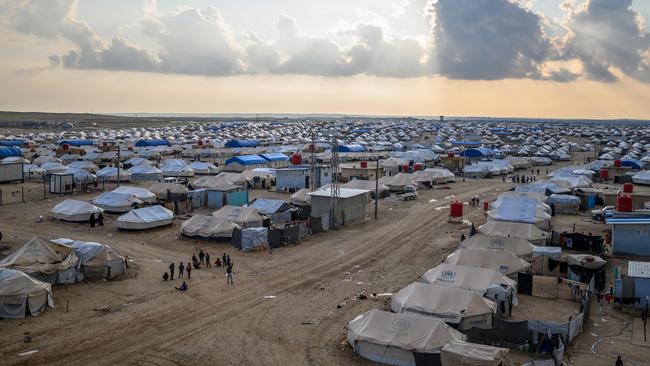
Fights between hardliner Islamic State devotees and others have resulted in several women being killed.
It’s a humanitarian and security disaster in the making.
And this week, the situation worsened dramatically when Turkey launched air strikes and artillery barrages across the border, sending in troops and targeting the Kurdish population of northeastern Syria.
Bombs are now falling less than 100km from the camp, and the relative peace of the region has been shattered.
Schools are closed, government services, pharmacies and hospitals are shut and tens of thousands of civilians clog the roads in their attempt to flee south to avoid the fighting.
The mainly Kurdish Syrian Democratic Forces, who were on the front line against Islamic State for years, are now being diverted to the border. Some of them have had to leave their posts guarding refugee camps and prisons holding IS fighters scattered across the region.
Journalist Ossama Muhammad, from the city of Qamishli on the Turkish border, told the Herald Sun people were sleeping on the main roads in Hasakah province, where the al-Hawl camp is, because they had nowhere else to go.
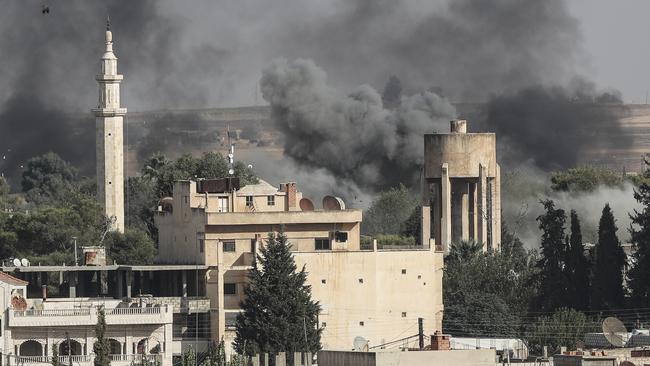
He said nine civilians had been killed in Qamishli city on the first day of the strikes on Thursday, and the Turkish military was targeting the entire border.
“All the Kurdish-majority areas are being bombed,’’ he said.
“It is quite bad now. Everyone is very scared.’’
Mr Muhammad said the situation had serious implications for the security of the refugee camps in the area and the prisons that were housing 11,000 Islamic State fighters, the last holdouts of the caliphate when the jihadists were overrun at Baghouz in March.
About 2000 of them are foreigners, including somewhere between 12 and 20 Australian men. Many of the prisons they are held in are converted government buildings and schools.
The SDF were manning the prisons and had bases close by the camps to thwart potential attacks from Islamic State sleeper cells, which were still active in the region.
“Now mostly the soldiers have left and gone to the border,’’ Mr Muhammad said.
“It is the same for the prisons. Mustafa Bali, the head of SDF media, he said the guards at the prisons had been sent to the border.
“I visited one of the prisons. There were 5000 people (inmates) there and it was a very simple school.
“It’s possible at any time the prisoners could get out. With this mess ... anything is possible.”
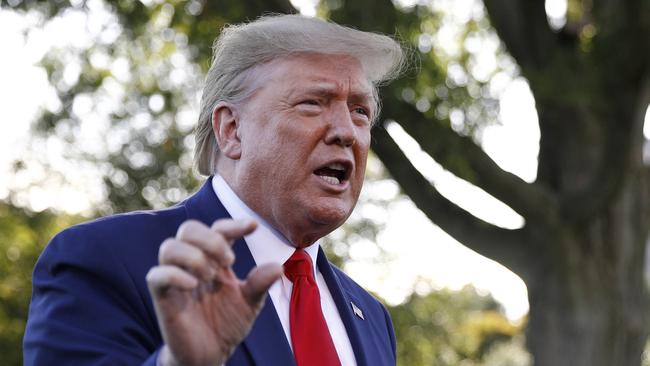
The al-Hawl camp, the largest in the Middle East, is named for the nearby township of al-Hawl — but it has grossly outgrown its host, a township of just 4000 people.
Australian women there include Zehra Duman of Melbourne, Kirstie Rosse-Emile and her two children, Mariam Dabboussy of Sydney and Mariam Raab and her four children, the family of the deceased fighter and ringleader of Australia’s foreign fighter cabal, Sydney man Muhammad Zahab.
Aminah Zahab, Muhammad Zahab’s mother, is also in the camp, as is his cousin Nesrine Zahab.
Nesrine is believed to have a son and she is the wife of former Sydney man Ahmed Merhi, who is on death row in Iraq.
The Australian government is resisting pressure from families and community groups to speed up repatriations.
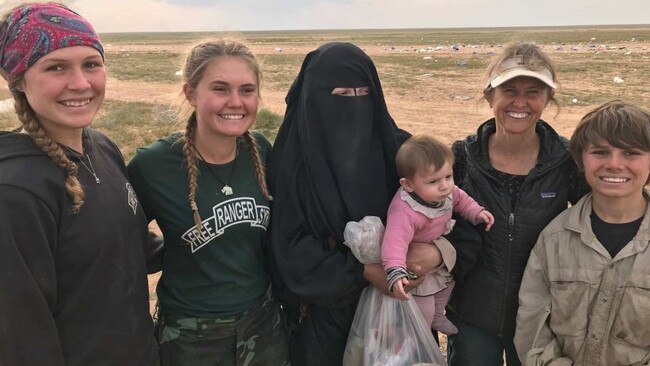
Prime Minister Scott Morrison and Foreign Affairs Minister Marise Payne reiterated this week that while they were “concerned for the Australians in these camps … we have previously stated the situation is dangerous and unpredictable and we will not put Australian officials and the public in danger’’.
The Syrian regime represses the Kurds and keeps the region, known as Rojava, in abject poverty.
It has no operational airport, no large-scale industry and the oil from small derricks operating in many fields is diverted to the regime in Damascus.
Yet the Kurds in Syria have maintained their culture. Muslim like most Syrians, they speak their own Kurdish language, and have distinctive food, music and customs.
Kurdish women rarely cover their heads, and there is no sectarian violence in a region where Christians, Kurds, Arabs and Assyrians live side-by-side.
Urban Kurds, particularly, have values similar to those of the West.
The Kurdish northeast has been the safest part of Syria for several years.
It is possible to cross the border from Iraq into Syria via a makeshift bridge at Faysh Khabur, a pulse-raising journey on a minibus on pontoons strung across the Tigris River.
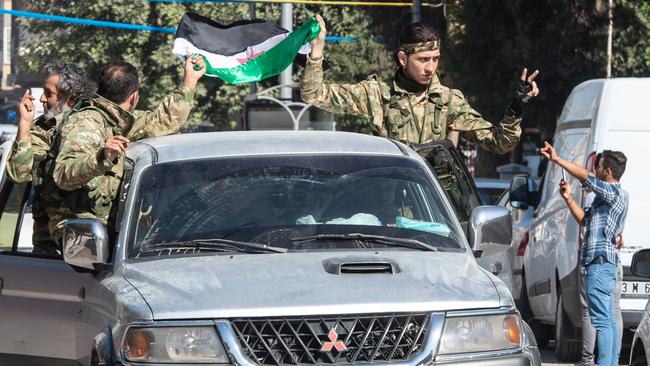
It’s an unofficial crossing tolerated by the Iraqi and Syrian regimes and is the lifeline for Kurds travelling between their two lands in northern Iraq and Syria.
More practically, the Australians have a standing offer from the United States, which has a military base at Hasakah, not too far from al-Hawl.
The US military flies regularly from the base to Erbil in Iraq, and routinely transports prisoners and other people of interest out of Syria.
And Australian officials have been in and out of the area discreetly.
The Herald Sun has obtained a video of an Australian official attending a press conference with a Kurdish official, apparently filmed in June.
In reality, the politics are more problematic than the logistics.
Home Affairs Minister Peter Dutton has said he wants Islamic State fighters dealt with “as far from our shores as possible’’.
While Australia and the West are concerned for their citizens — both those captured in the region, and the possibility foreign fighters could escape from the prisons and return to the battlefield to plot more attacks on the West, the Kurds once again face an existential threat.
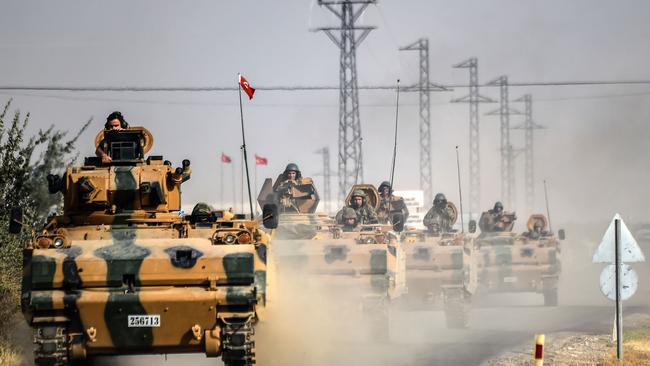
Their avowed enemy Turkey now has troops on the ground in Syrian Kurdish territory, as part of its campaign against the PKK, the militant Kurdish wing fighting a guerrilla separatist war in the borderlands in Turkey.
The international politics are problematic. Turkey is a NATO partner. The Kurds were firm allies in the fight against Islamic State, and were heavily backed by the west, particularly the United States.
MORE NEWS
NAME AND SHAME THREAT FOR DEFIANT PRIESTS
MAGISTRATE, FIANCEE SHATTER EX-PARTNERS
HACKERS EMPLOYED TO FIND MISSING AUSSIE
But the decision by Mr Trump to move troops out of the region before the impending Turkish insurgency cleared the way for the Turkish military to strike — and effectively abandoned the Kurds.
Mr Muhammad said the Kurdish people felt betrayed.
“We have been fighting as part of the Coalition for years against the most dangerous organisation in the world,’’ he said.
“This region is the most stable and secure in Syria, where all the different people are living.
“After all of this trust, it will not be enough to prevent the massacre on the Kurds.’’
Ellen Whinnett is News Corp’s former European and Middle Eastern correspondent, who was in Syria and Hasakah in March and April.
